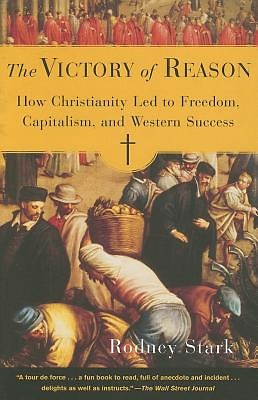Author: Stark, Rodney
Title: The Victory of Reason: How Christianity Led to Freedom, Capitalism, and Western Success.
ISBN: 1-4000-6228-4
Length: 281 pp
Published by: New York: Random House, 2005
Rodney Stark is a sociologist and historian of religion at Baylor University whose work I have much admired, especially The Rise of Christianity. He writes in a direct, no-nonsense way, perhaps as a result of an earlier career in journalism. His new book is a mono-causal explanation of the Rise of the West, a histoire a these written with passion in order to attribute the whole process to Christian rationality. It aims to dispose of other interpretations in the belief that they do not take religion into account (news to those of us raised on the Protestant Ethic, though Stark denies this is the proper religious explanation) and that some of the factors commonly mentioned are really part of what needs to be explained (surely Europe’s geography cannot fall into this category?)
A strong focus makes a book cohere. The particular line here is a variant of cultural explanation and suffers from the standard problem of the cultural as well as the mono-causal approach — of being too sure from the outset which is the cart and which is the horse. The advantage of assuming that Christian thought is the horse while the economy is the cart permits the historical material to be neatly organized. Its disadvantage is that, though it would not be fair to say Stark pays the alternative no attention at all, this gets short shrift. The possibility that economic change reacted back on religious thought and continually modified it is not fully worked out.

This, then, is a volume attempting to explain a great economic and political phenomenon that is not written by an economic historian, which is for better and for worse. For better: the prose is not intrinsically off-putting to non-specialists. Stark amuses with utterances such as ‘adapting the term [capitalism] for serious analysis is a bit like trying to make a social science concept out of “reactionary pig”‘ (p. 55). Yet a lack of familiarity with recent writing on economic history is for the worse. Sins of omission usually matter less than those of commission but in this case lead to excessive claims that the author is inventing the wheel. An example is the assertion that others have rarely taken Europe’s geography into account. Moreover the religious writings that Stark relies on suffer the usual difficulty of being hard to connect with the grubby details of everyday economic life, and in fact are not systematically connected here.
Much of the text is a fairly familiar account of European history, on which I have no space or need to comment. The narrative runs on to consider the relative performance of North and South America, because the publisher wanted to have it included. This is a pity because after all what one is seeing is just the working out of two hypertrophies of European societies in different settings. The space might have been better used to expand the rather brief sections on Ancient Greece, Islam and China, which are employed, very properly but not in detail, as ‘controls’ on the rise of Christendom.
The analytical core of the book is the argument that Christianity, and among religious and philosophical systems Christianity alone, chose the path of reason, which sufficiently accounts for economic growth and democracy in the West. Everything good, progressive and innovative is Christian and everything else is at best ineffective. At least the book is not politically correct! But what is really shown, amidst the wealth of learning we have come to expect from anyone who tackles such broad themes (and where Stark is certainly no slouch) is something different. It is that Christianity is highly adaptive, not least (in my view, though not in Stark’s) because it is so prone to schism and hence offers space for dissent.
Christianity may well have been much more adaptive than Confucianism or the Greek or Islamic religions, a trait that cannot have harmed Europe’s development. This is not, however, the same as showing that Christian attitudes were, to coin what seems the apposite phrase, fons et origo. People were engaging in capitalistic activity before the church came round to rationalizing it. Stark emphasizes the point. He repeatedly insists that economic change came very early and most definitely within Roman Catholicism. Medieval monks and nuns, he quotes Randall Collins as saying, ‘”had the Protestant ethic without Protestantism.”‘
The author does recognize that the relative primacy of religious thought and economic action is an issue but he condemns economic historians for arguing, post-Weber, that capitalism gave birth to the Protestant ethic rather than vice versa. Yet of his five authorities, four predate 1935 and the other is dated 1961. They were merely showing, he says, that the Reformation arose out of the bourgeois ferment of the sixteenth century. He demonstrates instead that economic activity had already produced a Puritanical backlash around Milan as early as the twelfth century. This was the minority movement of ascetics called the Humiliati who, reacting against their own material success, adopted a Puritan lifestyle within Roman Catholicism. Puritan culture was a response not a cause. This is credible but scarcely consistent with a ‘culture first’ thesis. As Stark says when he turns to Latin America, religion is always embedded in society.
Stark admits only one satisfactory survey of the Protestant upsurge in Latin America. This shows that committed Roman Catholics are scarcely distinguishable from Protestants in economic and political attitudes. But if it demonstrates that one sect creates no more economic advantage than the other, it still does not show that religion as a whole is the prime source of economic advantage: it shows only that the economically purposeful are more attracted to collective religious expression than are less successful people. The Rise of the West continues to resist single-factor explanations.



